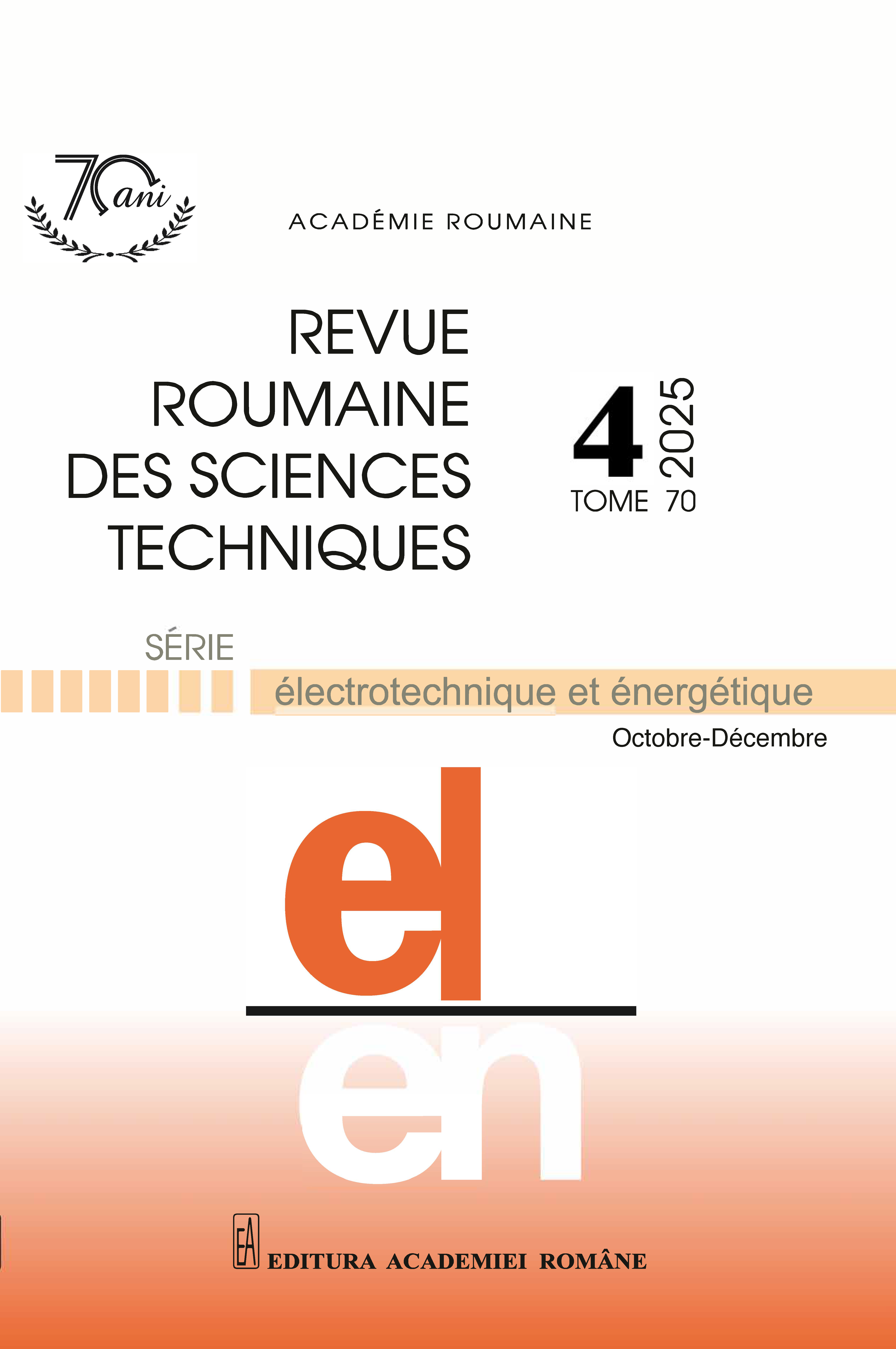APPRENTISSAGE DE LA REPRÉSENTATION INFORMÉE PAR LA PHYSIQUE POUR LA GESTION ÉNERGÉTIQUE DES VÉHICULES ÉLECTRIQUES HYBRIDES
DOI :
https://doi.org/10.59277/RRST-EE.2025.4.25Mots-clés :
Deep Learning, Energy Management Optimization, Fuel Cell Hybrid Electric Vehicles, Long-Short Term Memory , Machine LearningRésumé
L'intégration de systèmes basés sur la physique et l'apprentissage améliore les véhicules électriques hybrides à pile à combustible (FCHEV) pour un meilleur contrôle des performances et un fonctionnement efficace de la source d'énergie. Il est difficile d'équilibrer cette combinaison hétérogène, compte tenu des incertitudes et des fluctuations inhérentes à la modélisation physique complexe. Dans ce cadre, notre travail a un double objectif. Premièrement, une modélisation physique précise permet de générer efficacement des données. Cela permet de recueillir des données variées, proches de scénarios réels, ce qui aide à tirer des conclusions fiables. Plusieurs cycles de conduite connus ont été utilisés pour générer des données suffisantes pour les expériences et les résultats présentés dans ce travail. Deuxièmement, les données collectées sont soumises à un processus avancé d'apprentissage de la représentation à l'aide de fonctions adaptatives, ce qui améliore l'interaction entre les modèles d'apprentissage et les phénomènes physiques du système FCHEV. L'efficacité de l'approche suggérée est validée par une évaluation complète des algorithmes développés à l'aide de diverses mesures visuelles et numériques. Dans une analyse comparative, les résultats mettent en évidence l'efficacité de la méthodologie pour relever les défis de la gestion de l'énergie (EM) des véhicules électriques hybrides à pile à combustible (FCHEV).
Références
(1) M. Rasool, M.A. Khan, R. Zou, A comprehensive analysis of online and offline energy management approaches for optimal performance of fuel cell hybrid electric vehicles, Energies, 16, 8, pp. 1–33 (2023).
(2) Y. Cao, M. Yao, X. Sun, An overview of modelling and energy management strategies for hybrid electric vehicles, Applied Sciences, 13,10, pp. 1–23 (2023).
(3) M. Fayyazi et al., Artificial intelligence/machine learning in energy management systems, control, and optimization of hydrogen fuel cell vehicles, Sustainability, 15, 6, pp. 1–38 (2023).
(4) A.F. Glavan, V. Croitoru, Incremental learning for edge network intrusion detection, Rev. Roum. Sci. Techn. – Électrotechn. Et Énerg., 8, 3, pp. 301–306 (2023).
(5) J. Wang, J. Zhou, D. Xu, A real-time predictive energy management strategy of fuel cell/battery/ultra-capacitor hybrid energy storage system in electric vehicle, Chinese Automation Congress, Institute of Electrical and Electronics Engineers Inc (2020).
(6) V. Hraniak, Using discrete wavelet analysis of vibration signal for detection of electrical machines’ defects, Rev. Roum. Sci. Techn. – Électrotechn. Et Énerg., 68, 4, pp. 357–362 (2023).
(7) A. Benmouna, M. Becherif, L. Boulon, C. Dépature, H.S. Ramadan, Efficient experimental energy management operating for FC/battery/SC vehicles via hybrid artificial neural networks-passivity based control, Renew. Energy, 178, pp. 1291–1302 (2021).
(8) X. Hu, S. Liu, K. Song, Y. Gao, T. Zhang, Novel fuzzy control energy management strategy for fuel cell hybrid electric vehicles considering state of health, Energies, 14, 20, pp. 1–20 (2021).
(9) S.M. Sotoudeh, B. HomChaudhuri, A deep-learning-based approach to eco-driving-based energy management of hybrid electric vehicles, IEEE Trans. Transp. Electrif., 9, 3, pp. 3742–3752 (2023).
(10) Y. Wang et al., Genetic algorithm-based Fuzzy optimization of energy management strategy for fuel cell vehicles considering driving cycles recognition, Energy, 263, pp. 126112 (2023).
(11) S.N. Motapon, L.A. Dessaint, K. Al-Haddad, A comparative study of energy management schemes for a fuel-cell hybrid emergency power system of more-electric aircraft, IEEE Trans. Ind. Electron., 61, 3, pp. 1320–1334 (2014).
(12) T. Berghout, T. Bentrcia, W.H. Lim, M. Benbouzid, A neural network weights initialization approach for diagnosing real aircraft engine inter-shaft bearing faults, Machines, pp. 1–13 (2023).
(13) Y. Yu, X. Si, C. Hu, J. Zhang, A review of recurrent neural networks: LSTM cells and network architectures, Neural Comput., 31, 7, pp. 1235–1270 (2019).
(14) B. Ponnuswamy, C. Columbus, S.R. Lakshmi, J. Chithambaram, Wind turbine fault modeling and classification using cuckoo-optimized modular neural networks, Rev. Roum. Sci. Techn. – Électrotechn. Et Énerg., 68, 4, pp. 369–374 (2023).
Téléchargements
Publiée
Numéro
Rubrique
Licence
(c) Copyright REVUE ROUMAINE DES SCIENCES TECHNIQUES — SÉRIE ÉLECTROTECHNIQUE ET ÉNERGÉTIQUE 2025

Ce travail est disponible sous licence Creative Commons Attribution - Pas d'Utilisation Commerciale - Pas de Modification 4.0 International.


